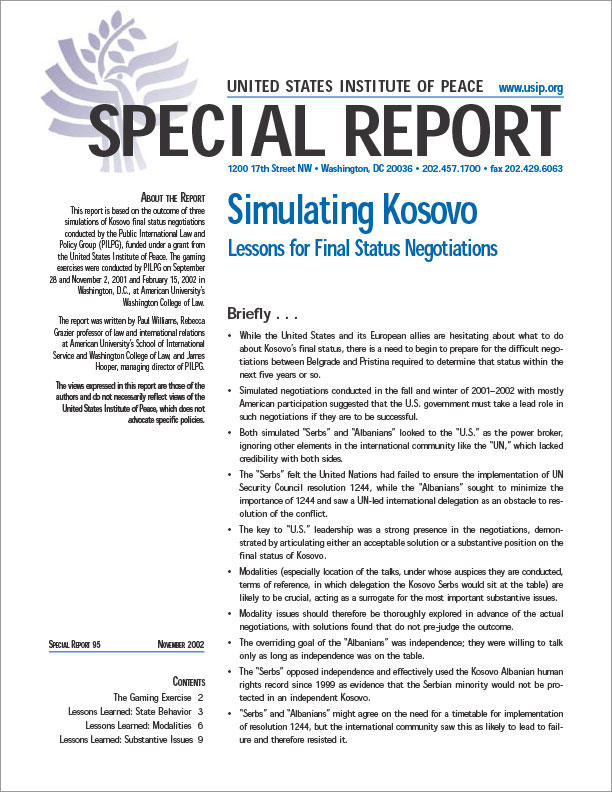This report is based on the outcome of three simulations of Kosovo final status negotiations conducted by the Public International Law and Policy Group (PILPG).

Summary
- While the United States and its European allies are hesitating about what to do about Kosovo's final status, there is a need to begin to prepare for the difficult negotiations between Belgrade and Pristina required to determine that status within the next five years or so.
- Simulated negotiations conducted in the fall and winter of 2001-2002 with mostly American participation suggested that the U.S. government must take a lead role in such negotiations if they are to be successful.
- Both simulated "Serbs" and "Albanians" looked to the "U.S." as the power broker, ignoring other elements in the international community like the "UN," which lacked credibility with both sides.
- The "Serbs" felt the United Nations had failed to ensure the implementation of UN Security Council resolution 1244, while the "Albanians" sought to minimize the importance of 1244 and saw a UN-led international delegation as an obstacle to resolution of the conflict.
- The key to "U.S." leadership was a strong presence in the negotiations, demonstrated by articulating either an acceptable solution or a substantive position on the final status of Kosovo.
- Modalities (especially location of the talks, under whose auspices they are conducted, terms of reference, in which delegation the Kosovo Serbs would sit at the table) are likely to be crucial, acting as a surrogate for the most important substantive issues.
- Modality issues should therefore be thoroughly explored in advance of the actual negotiations, with solutions found that do not pre-judge the outcome.
- The overriding goal of the "Albanians" was independence; they were willing to talk only as long as independence was on the table.
- The "Serbs" opposed independence and effectively used the Kosovo Albanian human rights record since 1999 as evidence that the Serbian minority would not be protected in an independent Kosovo.
- "Serbs" and "Albanians" might agree on the need for a timetable for implementation of resolution 1244, but the international community saw this as likely to lead to failure and therefore resisted it.
- When left to their own devices, the "Albanian" and "Serbian" delegations were ready to engage in division and reallocation of territory, exchanging land in northern Kosovo for land in southern Serbia and ignoring the consequences for Macedonia and Bosnia.
- If redistributing territory to promote ethnic homogeneity is to be avoided, the international community, led by the United States, will have to prevent it.
- "Serbs" and "Albanians" agreed that Serbs should return to their homes, and that an international force should oversee such a return.
- "European" delegates found it difficult to formulate and implement a united position and generally played secondary roles.
- Although the "French" and "British" delegations in the simulations did not line up behind a European agenda, they joined together to use the promise of EU membership and economic incentives to encourage the "Serbs" to cooperate.
- Implementation of any final status agreement will require a prolonged international civilian and military presence. It would make little sense to spend the time and effort to gain some kind of agreement on final status only to see it collapse under the strain of security or economic difficulties.
About the Report
This report is based on the outcome of three simulations of Kosovo final status negotiations conducted by the Public International Law and Policy Group (PILPG), funded under a grant from the United States Institute of Peace. The gaming exercises were conducted by PILPG on September 28 and November 2, 2001 and February 15, 2002 in Washington, D.C., at American University's Washington College of Law.
The report was written by Paul Williams, Rebecca Grazier professor of law and international relations at American University's School of International Service and Washington College of Law, and James Hooper, managing director of PILPG.
The views expressed in this report are those of the authors and do not necessarily reflect views of the United States Institute of Peace, which does not advocate specific policies.